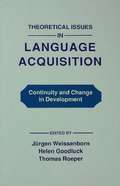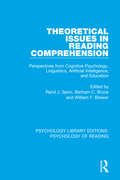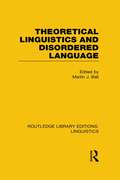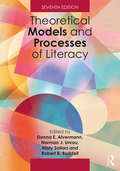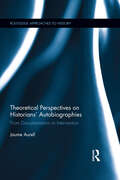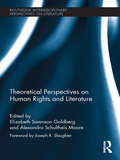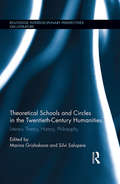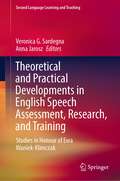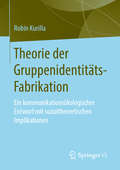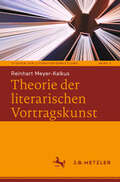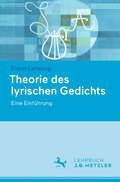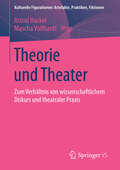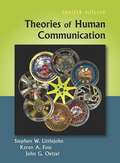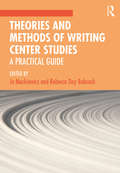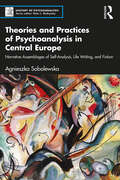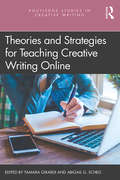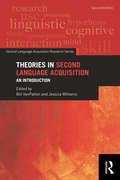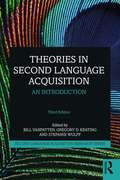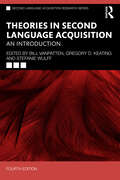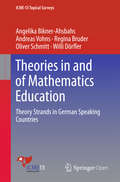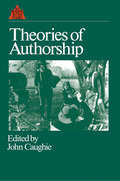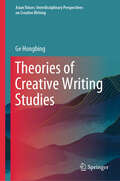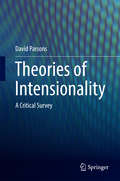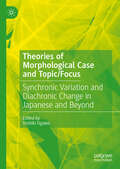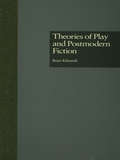- Table View
- List View
Theoretical Issues in Language Acquisition: Continuity and Change in Development
by Helen Goodluck Thomas Roeper Jürgen WeissenbornIn recent linguistic theory, there has been an explosion of detailed studies of language variation. This volume applies such recent analyses to the study of child language, developing new approaches to change and variation in child grammars and revealing both early knowledge in several areas of grammar and a period of extended development in others. Topics dealt with include question formation, "subjectless" sentences, object gaps, rules for missing subject interpretation, passive sentences, rules for pronoun interpretation and argument structure. Leading developmental linguists and psycholinguists show how linguistic theory can help define and inform a theory of the dynamics of language development and its biological basis, meeting the growing need for such studies in programs in linguistics, psychology, and cognitive science.
Theoretical Issues in Reading Comprehension: Perspectives from Cognitive Psychology, Linguistics, Artificial Intelligence and Education (Psychology Library Editions: Psychology of Reading #11)
by Rand J. Spiro, Bertram C. Bruce and William F. BrewerResearch in cognitive psychology, linguistics, and artificial intelligence – the three disciplines that have the most direct application to an understanding of the mental processes in reading – is presented in this multilevel work, originally published in 1980, that attempts to provide a systematic and scientific basis for understanding and building a comprehensive theory of reading comprehension. The major focus is on understanding the processes involved in the comprehension of written text. Underlying most of the contributions is the assumption that skilled reading comprehension requires a coordination of text with context in a way that goes far beyond simply chaining together the meanings of a string of decoded words. The topics discussed are divided into five general areas: Global Issues; Text Structure; Language, Knowledge of the World, and Inference; Effects of Prior Language Experience; and Comprehension Strategies and Facilitators, and represent a broad base of methodology and data that should be of interest not only to those concerned with the reading process, but also to basic science researchers in psychology, linguistics, artificial intelligence, and related disciplines.
Theoretical Linguistics and Disordered Language: Linguistics: Theoretical Linguistics And Disordered Language (Routledge Library Editions: Linguistics)
by Martin J. BallThe rapid increase of interest in disordered speech and language among linguists over the past decade or so has resulted in many books of practical help to speech pathologists in terms of assessment and remediation. Little, however, has appeared to examine the theoretical implications of the interaction between these two fields. This book aims to fill this gap, by showing how speech pathology can inform linguistic theory and vice versa.
Theoretical Models and Processes of Literacy
by Donna E. Alvermann Norman J. Unrau Misty Sailors Robert B. RuddellThe Seventh Edition of this foundational text represents the most comprehensive source available for connecting multiple and diverse theories to literacy research, broadly defined, and features both cutting-edge and classic contributions from top scholars. Two decades into the 21st century, the Seventh Edition finds itself at a crossroads and differs from its predecessors in three major ways: the more encompassing term literacy replaces reading in the title to reflect sweeping changes in how readers and writers communicate in a digital era; the focus is on conceptual essays rather than a mix of essays and research reports in earlier volumes; and most notably, contemporary literacy models and processes enhance and extend earlier theories of reading and writing. Providing a tapestry of models and theories that have informed literacy research and instruction over the years, this volume’s strong historical grounding serves as a springboard from which new perspectives are presented. The chapters in this volume have been selected to inspire the interrogation of literacy theory and to foster its further evolution. This edition is a landmark volume in which dynamic, dialogic, and generative relations of power speak directly to the present generation of literacy theorists and researchers without losing the historical contexts that preceded them. Some additional archival essays from previous editions are available on the book’s eResource. New to the Seventh Edition: Features chapters on emerging and contemporary theories that connect directly to issues of power and contrasts new models against more established counterparts. New chapters reflect sweeping changes in how readers and writers communicate in a digital era. Slimmer volume is complemented by some chapters from previous editions available online.
Theoretical Perspectives on Historians' Autobiographies: From Documentation to Intervention (Routledge Approaches to History #15)
by Jaume AurellE. H. Carr wrote, "study the historian before you begin to study the facts." This book approaches the life, work, ideas, debates, and the context of key 20th- and 21st-century historians through an analysis of their life writing projects viewed as historiographical sources. Merging literary studies on autobiography with theories of history, it provides a systematic and detailed analysis of the autobiographies of the most outstanding historians, from the classic texts by Giambattista Vico, Edward Gibbon and Henry Adams, to the Annales historians such as Fernand Braudel, Philippe Ariès and Georges Duby, to Marxist historians such as Eric Hobsbawm and Annie Kriegel, to postmodern historians such as Carolyn Steedman, Robert A. Rosenstone, Carlos Eire, Luisa Passerini, Elisabeth Roudinesco, Gerda Lerner and Sheila Fitzpatrick, and to "interventional" historians such as Geoff Eley, Jill Ker Conway, Natalie Davis and Gabrielle Spiegel. Using a comparative approach to these texts, this book identifies six historical-autobiographical styles: humanistic, biographic, ego-historical, monographic, postmodern, and interventional. By privileging historians' autobiographies, this book proposes a renewed history of historiography, one that engages the theoretical evolution of the discipline, the way history has been interpreted by historians, and the currents of thought and ideologies that have dominated and influenced its writing in the 20th and 21st centuries.
Theoretical Perspectives on Human Rights and Literature (Routledge Interdisciplinary Perspectives on Literature)
by Joseph R. Slaughter Alexandra Schultheis Moore Elizabeth Swanson GoldbergWhat can literary theory reveal about discourses and practices of human rights, and how can human rights frameworks help to make sense of literature? How have human rights concerns shaped the literary marketplace, and how can literature impact human rights concerns? Essays in this volume theorize how both literature and reading literarily can shape understanding of human rights in productive ways. Contributors to Theoretical Perspectives on Human Rights and Literature provide a shared history of modern literature and rights; theorize how trauma, ethics, subjectivity, and witnessing shape representations of human rights violations and claims in literary texts across a range of genres (including poetry, the novel, graphic narrative, short story, testimonial, and religious fables); and consider a range of civil, political, social, economic, and cultural rights and their representations. The authors reflect on the imperial and colonial histories of human rights as well as the cynical mobilization of human rights discourses in the name of war, violence, and repression; at the same time, they take seriously Gayatri Spivak’s exhortation that human rights is something that we "cannot not want," exploring the central function of storytelling at the heart of all human rights claims, discourses, and policies.
Theoretical Schools and Circles in the Twentieth-Century Humanities: Literary Theory, History, Philosophy (Routledge Interdisciplinary Perspectives on Literature #42)
by Marina Grishakova and Silvi SalupereSchools and circles have been a major force in twentieth-century intellectual movements. They fostered circulation of ideas within and between disciplines, thus altering the shape of intellectual inquiry. This volume offers a new perspective on theoretical schools in the humanities, both as generators of conceptual knowledge and as cultural phenomena. The structuralist, semiotic, phenomenological, and hermeneutical schools and circles have had a deep impact on various disciplines ranging from literary studies to philosophy, historiography, and sociology. The volume focuses on a set of loosely interrelated groups, with a strong literary, linguistic, and semiotic component, but extends to the fields of philosophy and history—the interdisciplinary conjunctions arising from a sense of conceptual kinship. It includes chapters on unstudied or less studied groups, such as Tel Aviv School of poetics and semiotics or the research group Poetics and Hermeneutics. The volume presents a significant supplement to the standard historical accounts of literary, critical, and related theory in the twentieth century. It enhances and complicates our understanding of the twentieth-century intellectual and academic history by showing schools and circles in the state of germination, dialogue, controversy, or decline, in their respective historical and institutional settings, while reaching simultaneously beyond those dense settings to the new cultural and ideological situations of the twenty-first century.
Theoretical and Practical Developments in English Speech Assessment, Research, and Training: Studies in Honour of Ewa Waniek-Klimczak (Second Language Learning and Teaching)
by Anna Jarosz Veronica G. SardegnaThis edited book presents and discusses theoretical, practical, and research developments in English pronunciation in order to establish evidence-based directions and recommendations for best practices in English speech assessment, research, and training. It features leading pronunciation experts from diverse contexts who share cutting-edge research and valuable insights. The collection consists of six parts. Part 1 introduces the aims, focus, and structure of the book, and describes its intended audience. Part 2 reviews, provides empirical evidence, and offers critical analyses guiding different aspects of English speech assessment. Parts 3 and 4 report empirical findings and research perspectives on the perception and production of English speech. Part 5 shares current practices in phonetic training and their effect on learners and listeners. Part 6 presents theoretical perspectives on the acquisition of phonology in multilinguals.
Theorie der Gruppenidentitäts-Fabrikation: Ein kommunikationsökologischer Entwurf mit sozialtheoretischen Implikationen
by Robin KurillaBisher gibt es keine umfassende und kohärente Annäherung an die Bestimmung der an der Konstruktion von Gruppenidentitäten beteiligten kommunikativen und präkommunikativen Prozesse. Die vorliegende Untersuchung schließt diese Lücke durch die Entwicklung einer einheitlichen theoretischen Grundlage, mit der sich empirische Konstruktionsprozesse erfassen lassen. Überdies leistet sie einen Beitrag zur Domäne der Gruppenkommunikationsforschung. Es wird ein grundlagentheoretisches Flussbett geschaffen, das eine begriffliche Fundierung der Konzeption von Inter- und Intragruppenkommunikation liefert, die nicht von ‚objektiven’ Kategorien ihren Ausgang nimmt, sondern von de facto stattfindenden Vergesellschaftungsprozessen. Zudem wird am Beispiel der Gruppenidentitätskonstruktion die Architektur einer innovativen Sozialtheorie vorgestellt, die den Ansprüchen kommunikationswissenschaftlicher und womöglich auch in anderen Disziplinen zu verortender Erkenntnisinteressen genügt.
Theorie der literarischen Vortragskunst (Studien zur Literaturvermittlung #5)
by Reinhart Meyer-KalkusTheoretische Ansätze zur Analyse literarischer Vortragskunst thematisieren gewöhnlich nur Teilaspekte, aber nicht das Zusammenspiel aller ihrer Faktoren, also von Akteuren, Zuhörern, Räumen, Performances, Vortragsvorlagen und Medientechniken. Auf der Grundlage von Goffmans Performance-Begriff und der amerikanischen Ethnographie des Sprechens entwickelt das vorliegende Buch eine umfassende Konzeption der Vortragskunst als Interaktionsritual und greift dabei auf sprech- und literaturwissenschaftliche Formanalysen zurück, um die Vortragsstimme, ihre unterschiedlichen Sprechgattungen und prosodischen Ausdrucksmittel zu beschreiben.
Theorie des lyrischen Gedichts: Eine Einführung
by Dieter LampingAusgehend von handlichen Definitionen des Gedichts und des lyrischen Gedichts erörtert die Einführung Grundfragen der Lyrik-Theorie – etwa die, welche Bedeutung die Form beim Verstehen von Verstexten hat, wer in ihnen jeweils spricht, inwiefern Lyrik auch fiktional sein kann, welche Typen des lyrischen Gedichts sich unterscheiden lassen und welche Funktionen Lyrik erfüllt. Ihre Beispiele entnimmt sie der Weltliteratur von der Antike bis in die Gegenwart: von Sappho über Shakespeare und Goethe bis zu Rilke, Brecht und Kästner. Dabei bemüht sie sich um eine ohne spezielle Voraussetzungen verständliche Darstellung.
Theorie und Theater
by Astrid Hackel Mascha VollhardtDie Theaterwissenschaft beruft sich gern auf den gemeinsamen Ursprung von Theorie und Theater. Ein Grund zu fragen, auf welche Weise akademische Diskurse Eingang in zeitgenössische Performances, Tanz- und Theaterinszenierungen finden und was diese umgekehrt zur Vermittlung oder sinnlichen Fremdwerdung theoretischen Wissens beitragen können. Untersucht werden die zahlreichen Verflechtungen und Unwägbarkeiten zwischen Theorie und Theater, die szenische Selbstreferenzialität und Widerständigkeit gegen die eigene Theoretisierbarkeit, die Herausforderungen im Umgang mit humanwissenschaftlichen, (post-)feministischen und queeren Theorien sowie der Stellenwert von Sprache, Sinn und Sinnlichkeit in zeitgenössischen Inszenierungen.
Theories Of Human Communication
by Stephen W. Littlejohn Karen A. Foss John G. OetzelFor over forty years, Theories of Human Communication has facilitated the understanding of the theories that define the discipline of communication. The authors present a comprehensive summary of major communication theories, current research, extensions, and applications in a thoughtfully organized and engaging style. Part I of the extensively updated twelfth edition sets the stage for how to think about and study communication. The first chapter establishes the foundations of communication theory. The next chapter reviews four frameworks for organizing the theories and their contributions to the nature of inquiry. Part II covers theories centered around the communicator, message, medium, and communication with the nonhuman. Part III addresses theories related to communication contexts #8212;relationship, group, organization, health, culture, and society. #34;From the Source #34; contributions from theorists provide insight into the inspirations, motivations, and goals behind the theories. Online instructor resource materials include sample syllabi, key terms, exam questions, and text graphics.
Theories and Methods of Writing Center Studies: A Practical Guide
by Jo Mackiewicz Rebecca BabcockThis collection helps students and researchers understand the foundations of writing center studies in order to make sound decisions about the types of methods and theoretical lenses that will help them formulate and answer their research questions. In the collection, accomplished writing center researchers discuss the theories and methods that have enabled their work, providing readers with a useful and accessible guide to developing research projects that interest them and make a positive contribution. It introduces an array of theories, including genre theory, second-language acquisition theory, transfer theory, and disability theory, and guides novice and experienced researchers through the finer points of methods such as ethnography, corpus analysis, and mixed-methods research. Ideal for courses on writing center studies and pedagogy, it is essential reading for researchers and administrators in writing centers and writing across the curriculum or writing in the disciplines programs.
Theories and Practices of Psychoanalysis in Central Europe: Narrative Assemblages of Self-Analysis, Life Writing, and Fiction (History of Psychoanalysis)
by Agnieszka SobolewskaTheories and Practices of Psychoanalysis in Central Europe explores the close relationship between psychoanalysis, psycho-medical discourses, literature, and the visual arts of the late 1800s and early 1900s in Central Europe. Agnieszka Sobolewska addresses the issue of theories and practices of psychoanalysis in Central Europe and the need to undertake interdisciplinary reflection on the specificity of psychoanalytic literary genres and fin-de-siècle psycho-medical discourses. With a focus on the circulation of Freudianism in the territories of present-day Austria, Hungary, the Czech Republic, Poland, and Germany, the book considers the creative transformations that psychoanalytic thought underwent in these countries and reflects on the specificity of psychoanalytic literary genres and the pivotal role of lifewriting genres in the psychoanalytic movement. Sobolewska’s work both fills a visible gap in research on the history of psychoanalysis in Central Europe before the outbreak of World War II and offers the first insightful analysis of the role of life writing in the development of psychoanalytic thought. Theories and Practices of Psychoanalysis in Central Europe will be of great interest to psychoanalysts in practice and in training as well as scholars of the history of psychoanalysis, the history of psychology, literature, cultural anthropology, and modernism.
Theories and Strategies for Teaching Creative Writing Online (Routledge Studies in Creative Writing)
by Tamara GirardiAs the online world of creative writing teaching, learning, and collaborating grows in popularity and necessity, this book explores the challenges and unique benefits of teaching creative writing online. This collection highlights expert voices who have taught creative writing effectively in the online environment, to broaden the conversation regarding online education in the discipline, and to provide clarity for English and writing departments interested in expanding their offerings to include online creative writing courses but doing so in a way that serves students and the discipline appropriately. Interesting as it is useful, Theories and Strategies for Teaching Creative Writing Online offers a contribution to creative writing scholarship and begins a vibrant discussion specifically regarding effectiveness of online education in the discipline.
Theories in Second Language Acquisition: An Introduction (2nd Edition)
by Jessica Williams Bill VanPattenThe second edition of Theories in Second Language Acquisition seeks to build on the strengths of the first edition by surveying the major theories currently used in second language acquisition research. This volume is an ideal introductory text for undergraduate and graduate students in SLA and language teaching. Each chapter focuses on a single theory, written by a leading scholar in the field in an easy-to-follow style – a basic foundational description of the theory, relevant data or research models used with this theory, common misunderstandings, and a sample study from the field to show the theory in practice. This text is designed to provide a consistent and coherent presentation for those new to the field who seek basic understanding of theories that underlie contemporary SLA research. Researchers will also find the book useful as a "quick guide" to theoretical work outside their respective domains.
Theories in Second Language Acquisition: An Introduction (Second Language Acquisition Research Series)
by Bill VanPatten Stefanie Wulff Gregory D. KeatingThis third edition of the best-selling Theories in Second Language Acquisition surveys the major theories currently used in second language acquisition (SLA) research, serving as an ideal introductory text for undergraduate and graduate students in SLA and language teaching. Designed to provide a consistent and coherent presentation for those seeking a basic understanding of the theories that underlie contemporary SLA research, each chapter focuses on a single theory. Chapters are written by leading scholars in the field and incorporate a basic foundational description of the theory, relevant data or research models used with this theory, common misunderstandings, and a sample study from the field to show the theory in practice. New to this edition is a chapter addressing the relationship between theories and L2 teaching, as well as refreshed coverage of all theories throughout the book. A key work in the study of second language acquisition, this volume will be useful to students of linguistics, language and language teaching, and to researchers as a guide to theoretical work outside their respective domains.
Theories in Second Language Acquisition: An Introduction (Second Language Acquisition Research Series)
by Bill VanPatten, Gregory D. Keating and Stefanie WulffThis fourth edition of the best-selling Theories in Second Language Acquisition surveys the major theories and frameworks currently used in second language acquisition (SLA) research, serving as an ideal introductory text for graduate students in SLA and language teaching.Designed to provide a consistent and coherent presentation for those seeking a basic understanding of the theories and frameworks that underlie contemporary SLA research, each chapter focuses on a single theory. Chapters are written by leading scholars in the field and incorporate a basic foundational description of the theory, relevant data or research models used with this theory, common misunderstandings, and a sample study from the field to show the theory in practice. New to this fully revised edition is the incorporation of a new theoretical framework to replace several lesser-used theories.A key work in the study of second language acquisition, this volume will be useful to students of linguistics, language, and language teaching, and to researchers as a guide to theoretical work outside their respective domains.
Theories in and of Mathematics Education
by Angelika Bikner-Ahsbahs Andreas Vohns Regina Bruder Oliver Schmitt Willi DörflerThis survey provides an overview of German meta-discourse on theories and mathematics education as a scientific discipline, from the 1970s to the 1990s. Two theory strands are offered: a semiotic view related to Peirce and Wittgenstein (presented by Willibald Dorfler), and the theory of learning activity by Joachim Lompscher (presented by Regina Bruder and Oliver Schmitt). By networking the two theoretical approaches in a case study of learning fractions, it clarifies the nature of the two theories, how they can be related to inform practice and renew TME-issues for mathematics education as a scientific discipline. Hans-Georg Steiner initiated the first of five international conferences on Theories of Mathematics Education (TME) to advance the founding of mathematics education as a scientific discipline, and subsequently German researchers have continued to focus on TME topics but within various theory strands. "
Theories of Authorship
by John CaughieThe film director or `auteur' has been central in film theory and criticism over the past thirty years. Theories of Authorship documents the major stages in the debate about film authorship, and introduces recent writing on film to suggest important ways in which the debate might be reconsidered.
Theories of Creative Writing Studies (Asian Voices: Interdisciplinary Perspectives on Creative Writing)
by Ge HongbingThis book provides a groundbreaking approach to creative writing theory, offering a comprehensive exploration of its core principles and methodologies. Focusing on creative writing as an ontological practice, it redefines the essence of literature and writing, while integrating new perspectives on AI-assisted writing, creative industries, and writing pedagogy. This work combines Chinese and global views to address the pressing need for a systematic theoretical framework in the field of creative writing. It is intended for graduate students, researchers, and educators in creative writing, literary studies, and cultural industries. The book offers valuable insights into the evolving landscape of creative writing theory and its application in education, industry, and culture. Key features include its original theoretical framework, an interdisciplinary approach that connects theory and practice, and the exploration of AI's impact on creative writing. This book is a must-have resource for advancing both academic and practical understanding of creative writing.
Theories of Intensionality
by David ParsonsThis book offers a comprehensive primer for the study of intensionality. It explores and assesses those key theories of intensionality which have been developed in the twentieth and early twenty-first centuries. Each of the examined theories is tested as to whether it can account for the problems associated with (A) the intersubstitution salva veritate of co-extensional expressions, and (B) existential generalisation. All of these theories are subsequently compared so as to determine which of them comes closest to successfully solving these problems. The book examines four kinds of intensionalist approaches: the Fregean approach (including Church's formalisation of Frege's theory); the possible-worlds approaches of Carnap, Montague and Cresswell; the theory of properties relations and propositions devised by Bealer; and the Meinongian approaches put forward by Zalta and Priest. The book also proposes an alternative to intensionalism: sententialism. Sententialists argue that the problems of intensionality could be solved by appealing to linguistic items (usually sentences) rather than intensional entities. Drawing on the works of Quine, Davidson, Scheffler and R. M. Martin, it explores the viability and value of sententialism as an alternative to intensionalism.
Theories of Morphological Case and Topic/Focus: Synchronic Variation and Diachronic Change in Japanese and Beyond
by Yoshiki OgawaThis edited book brings together studies on morphological case in Japanese, English, and Bantu languages, among others, from morphosyntactic, semantic and historical perspectives. Languages are divided into two types in terms of case: nominative-accusative languages and ergative-absolutive languages. Even if we limit our attention to nominative-accusative languages, morphological case on subjects and objects can vary across languages or even within a single language, either synchronically or diachronically. For instance, certain stative predicates in Japanese allow their subjects and objects to be marked with dative and nominative case, respectively, and subjects in adnominal clauses in Japanese can be marked with genitive case; moreover, genitive subject marking in adnominal clauses has decreased over the past few centuries. Licensing relationships between predicates and cases can also have idiolectal, dialectal, and/or geographical micro-variations and intergenerational and/or diachronic micro-change. This book draws parallels and examines differences between examples of European, Asian and African languages, and discusses whether and how licensing of certain morphological cases (especially, subject marking) is related to the grammatical functions such as Topic and Focus. It will be of interest to researchers in Theoretical Linguistics, particularly those involved with Language Variation and Change, Linguistic Typology, Morphology and Syntax, and Generative Grammar.
Theories of Play and Postmodern Fiction (Comparative Literature and Cultural Studies #3)
by Brian EdwardsDrawing on developments in critical theory and postmodernist fiction, this study makes an important contribution to the appreciation of playforms in language, texts, and cultural practices. Tracing trajectories in theories of play and game, and with particular attention to the writings of Nietzsche, Wittgenstein, Bakhtin, and Derrida, the author argues that the concept of play provides perspectives on language and communication processes useful both for analysis of literary texts and also for understanding the interactive nature of constructions of knowledge.
